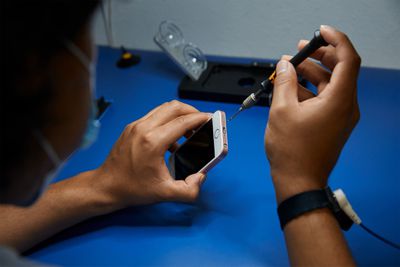U.S. FTC Commits to Fighting Against Unlawful Repair Restrictions
The United States Federal Trade Commission today announced that it is committed to devoting more of its resources to fight against unlawful repair restrictions in a move that has the potential to impact Apple in the future.

Earlier this month, U.S. President Joe Biden called on the FTC to create new right to repair rules that will prevent manufacturers from limiting consumers and businesses from repairing their own electronic devices. The FTC today followed up with a policy statement [PDF] and said that it plans to prioritize investigations into unlawful repair restrictions.
Restricting consumers and businesses from choosing how they repair products can substantially increase the total cost of repairs, generate harmful electronic waste, and unnecessarily increase wait times for repairs. In contrast, providing more choice in repairs can lead to lower costs, reduce e-waste by extending the useful lifespan of products, enable more timely repairs, and provide economic opportunities for entrepreneurs and local businesses.
The FTC is urging the public to submit complaints and provide information to aid in its enforcement of right to repair options, and it will consider filing suit against those who violate the Magnuson-Moss Warranty Act in addition to scrutinizing repair restrictions for violation of antitrust laws.
The FTC also plans to monitor private litigation to look for opportunities to investigate unfair repair practices, working with state law enforcement and policymakers to update existing laws and regulations.
The Commission will bring an interdisciplinary approach to this issue, using resources and expertise from throughout the agency to combat unlawful repair restrictions. The FTC will also closely coordinate with state law enforcement and policymakers to ensure compliance and to update existing law and regulation to advance the goal of open repair markets.
In a statement, FTC Chair Lina Khan said that the FTC has a "range of tools" that can be used to "root out unlawful repair restrictions" and the new policy statement commits the FTC to "move forward on this issue with new vigor."
It's not yet clear how Apple might be impacted, but the company has fought against Right to Repair bills that have been proposed in multiple U.S. states. Apple claims that allowing independent repair shops to work on Apple devices without oversight could lead to security, safety and quality issues.
Popular Stories
Apple will launch its new iPhone 17 series in two months, and the iPhone 17 Pro models are expected to get a new design for the rear casing and the camera area. But more significant changes to the lineup are not expected until next year, when the iPhone 18 models arrive.
If you're thinking of trading in your iPhone for this year's latest, consider the following features rumored to be coming...
In select U.S. states, residents can add their driver's license or state ID to the Wallet app on the iPhone and Apple Watch, providing a convenient and contactless way to display proof of identity or age at select airports and businesses, and in select apps.
Unfortunately, this feature continues to roll out very slowly since it was announced in 2021, with only nine U.S. states, Puerto Rico,...
Apple does not plan to refresh any Macs with updated M5 chips in 2025, according to Bloomberg's Mark Gurman. Updated MacBook Air and MacBook Pro models are now planned for the first half of 2026.
Gurman previously said that Apple would debut the M5 MacBook Pro models in late 2025, but his newest report suggests that Apple is "considering" pushing them back to 2026. Apple is now said to be...
Three out of four iPhone 17 models will feature more RAM than the equivalent iPhone 16 models, according to a new leak that aligns with previous rumors.
The all-new iPhone 17 Air, the iPhone 17 Pro, and the iPhone 17 Pro Max will each be equipped with 12GB of RAM, according to Fixed Focus Digital, an account with more than two million followers on Chinese social media platform Weibo. The...
Since the iPhone X in 2017, all of Apple's highest-end iPhone models have featured either stainless steel or titanium frames, but it has now been rumored that this design decision will be coming to an end with the iPhone 17 Pro models later this year.
In a post on Chinese social media platform Weibo today, the account Instant Digital said that the iPhone 17 Pro models will have an aluminum...
Production of foldable OLED displays for Apple's first foldable iPhone have begun ahead of its expected launch next year, Korea's ETNews reports.
The first foldable iPhone's displays are being produced by Samsung Display, who are establishing a production line dedicated to the upcoming Apple device its A3 factory in Asan, Chungcheongnam-do. The production line will make displays exclusively...
A new Apple TV is expected to be released later this year, and a handful of new features and changes have been rumored for the device.
Below, we recap what to expect from the next Apple TV, according to rumors.
Rumors
Faster Wi-Fi Support
The next Apple TV will be equipped with Apple's own combined Wi-Fi and Bluetooth chip, according to Bloomberg's Mark Gurman. He said the chip supports ...
iPhone 17 Pro and iPhone 17 Pro Max models with displays made by BOE will be sold exclusively in China, according to a new report.
Last week, it emerged that Chinese display manufacturer BOE was aggressively ramping up its OLED production capacity for future iPhone models as part of a plan to recapture a major role in Apple's supply chain.
Now, tech news aggregator Jukan Choi reports...



















